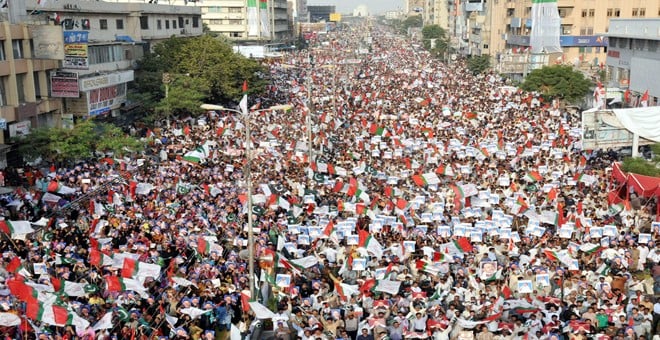

"Yeh sab MQM ki wajah se hai," my aunt has a perfect explanation every time we share an alert over the news of a street crime in our area. However, it is the same Aunt who sweated it out in 2008 elections to vote for the party. "Why not? Look at how many bridges and roads Mustafa Kamal has constructed. MQM is the only party that has worked for Karachi’s welfare," she explained her voting choice to a perplexed me as we exchanged notes at the polling station after casting our votes in the 2008 elections.
My aunt might have smartly separated her perception from her politics while exercising her right to vote, a large majority of politically aware Karachiites cannot decide how to deal with a party that has its origins in the city, represents the working class, yet has antagonized the local population, at times, to the breakup point. Today, it stands up as the only potent force against the most important threat faced by the city i.e. the rise of the Taliban.
We all know the journey of the Muttahida Qaumi Movement that marked its 30 years as an organised force last month. It started with the turning of the All Pakistan Mohajir Student Organisation into the Mohajir Qaumi Movement. The APMSO rose from the ranks of the Islami Jamiat-e-Tulaba, breaking up with the party over the Punjabi dominated character of the Jamiat.
At the time of its launch, the MQM adopted the agenda of "countering Punjabi hegemony and advocating a fair share of jobs for Mohajir in civil service and educational institutions" ("From Mohallah to Mainstream", Noman Baig). It re-asserted itself with the worst ethnic crisis between Urdu-speaking and Pashtun communities in Karachi, following the Bushra Zaidi case in 1985.
Positioning itself on a confrontational agenda, the party’s history is mired in violence. The 1988 Pakka Qilla follow up, the 1992 operation clean up, and the Naseerullah Babar phase had bloody ramifications for the city of Karachi. Back in those days, the party’s call for strikes would run for several days, its chief’s divisive statements in the media would antagonize the Sindhi and Pashtun population, criminal elements claiming to be associated with the party would threaten ordinary citizens everyday, and college and university students would remain uncertain about their future as the APMSO would frequently disrupt classes for a shut down.
When it was not confronting the state, the MQM was an ally of the government (with PPP in 1988, with Nawaz Sharif in 1990 and 1997, Musharraf in 2002, and PPP in 2008). It also ruled the city as local government in 2005 following a clean sweep in the local bodies elections. The MQM-nominated governor Ishrat-ul-Ibad is the longest serving governor in the history.
Every time it was in the government the MQM with its powerful presence in the assemblies, always took up the cause of the city: utilities, development resources, share of locals in jobs, threat of violence… It has maintained an uncompromising stand on the issues of the working class including general inflation, terrorism, state institutional deficits, and social issues. The MQM-led local government built a record number of infrastructure projects for Karachiites; roads, bridges, sewerage, fumigation, green-belt, and an impressive city government website, all seen by many as a mark of development.
For Karachiites, it is not just the actions of the party, it is the politics of the party that is of significance. It is massively grassroots, pro-active, has an unambiguous stand on local and national issues, and is backed by a very organised structure. The party’s unit offices are well-established down to the street level. Its members have a say in every aspect of area’s politics. It has strong roots in the working class drawing membership from local shop owners to builders to office accountants. It wields an influence with community organisations as well as traders groups. It protects and supports its members indiscriminately (including from adversarial neighbours).
Even for non-members, nine-zero is a call away. Its top leadership including Farooq Sattar, Nasreen Jalil, Haider Abbas Rizvi, among others, are easily accessible. The party’s support for Karachiites’ causes transcends party and ethnic lines. It engages with every citizen initiative be it about civic amenities, minorities rights, terrorism (especially led by the Hazara community), or the recent citizens initiative over the nuclear power plant in Karachi. The citizen-centric character of its politics is the most crucial need of the Karachiites whose other choices are the PPP and ANP, both having a local agenda that has much scope for an upgrade.
Yet, Karachiites have an uneasy relationship with the Muttahida, mainly summed up in the term "but" used both by its opponents and supporters. Its supporters (mostly Urdu speaking, but other communities too) find it difficult to separate party’s violent past, the attachment of the criminal elements with the party, and its ethnic tilt from its long list of achievements for the city. However, they would warn you that the alternate is the Taliban who are progressively taking over the city.
Its opponents have a strong case concerning the party’s violent tag. Yet, they have a feeble argument over the question of other political parties’ commitment to the city. They are also speechless over the party’s stand on national issues of terrorism, economic policies, social issues, and the liberal agenda -- the MQM being on the same page as its opponents, the PPP and the ANP.
The MQM may never be fully adopted by Karachi’s residents, especially as the influx of other communities from conflict-riddled parts of Pakistan continue, adding to the city’s dynamic population and politics. However, MQM’s non-supporters cannot disown the only force that has consistently stood up for the city. Perhaps they should exercise their politics like my aunt does. "Support only the ones that deliver!"